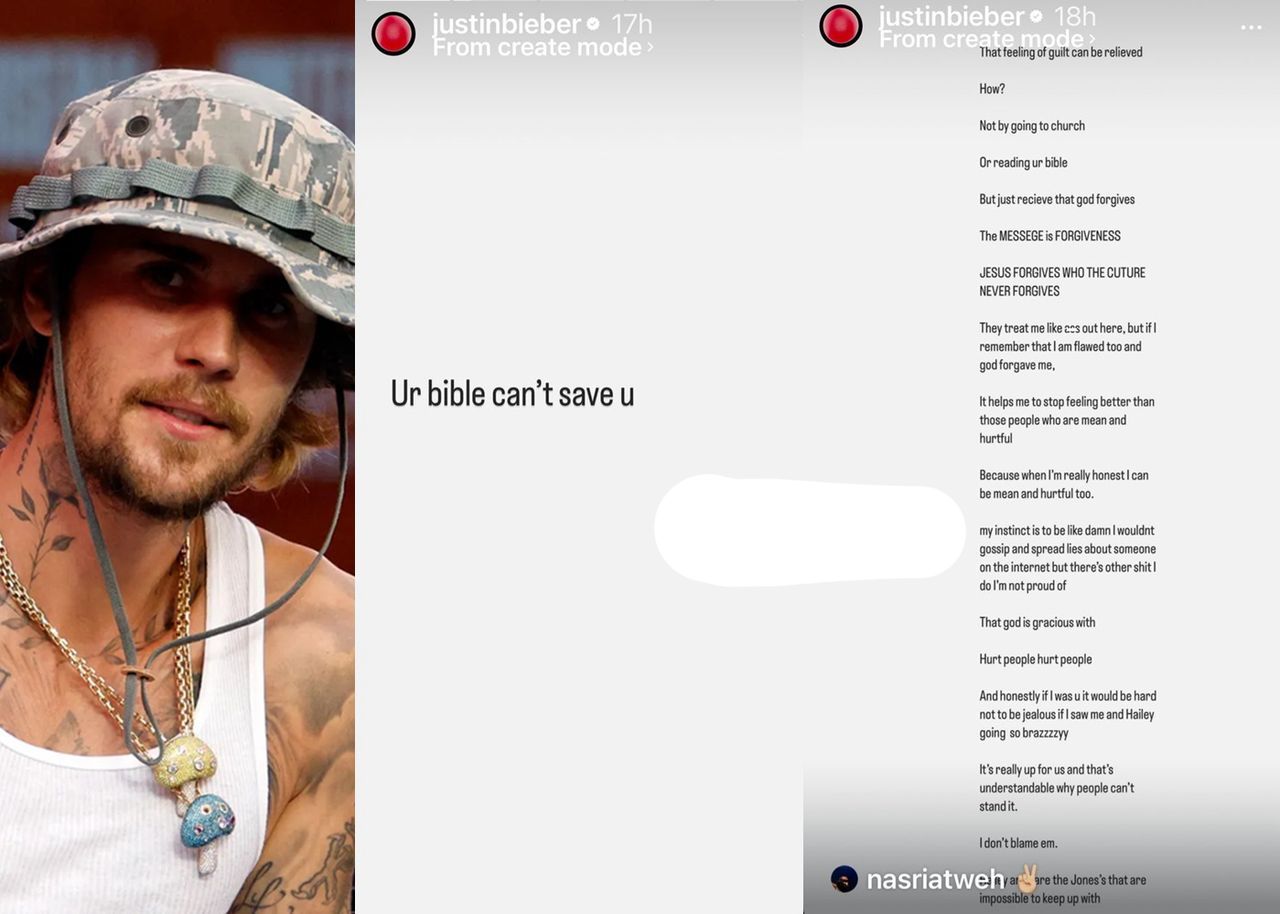
Justin Bieber’s Powerful Message on Forgiveness: “Your Bible Can’t Save You”

In a candid and deeply reflective moment, global superstar Justin Bieber recently shared an eye-opening message about guilt, forgiveness, and personal growth. Through a series of posts on his social media, Bieber revealed an intimate perspective on how he deals with guilt, offering a refreshing take that may challenge some traditional religious views. He shared that, despite the power of faith and scripture, it is not the Bible alone that offers redemption; instead, it is the act of receiving God’s forgiveness and recognizing the flaws within ourselves that truly leads to healing.
The message, which quickly resonated with his millions of followers, was a rare glimpse into the inner workings of the singer's mind, as he spoke openly about the struggles of living in the public eye and the pressures that come with it. Bieber’s honesty about his imperfections and the way he navigates public judgment and personal guilt has sparked a conversation on social media about the true meaning of forgiveness and self-reflection.
In his post, Bieber emphatically declared, “Your Bible can’t save you,” a statement that many of his fans and critics alike have been analyzing. This declaration, rather than being an attack on faith, served as a backdrop for Bieber’s deeper message: it is not religious rituals or scriptures alone that can lift the weight of guilt, but the acknowledgment of God’s grace and forgiveness.
Bieber explained that the feeling of guilt, which is something that most people experience at some point in their lives, can often feel overwhelming. However, he believes that the path to overcoming it isn’t found merely through attending church services or reading the Bible. Instead, he shared that one must come to terms with the fact that God has already forgiven them for their mistakes, and that forgiveness is the ultimate release from guilt.
“The message is forgiveness,” Bieber wrote, highlighting the central theme of his reflections. “Jesus forgives who the culture never forgives.” This was a pointed statement about the unforgiving nature of society, which often condemns individuals for their past mistakes without offering them a chance for redemption. In contrast, Bieber emphasized that God’s love and forgiveness are limitless, regardless of the mistakes we make or how harshly the world may judge us.
In his message, Bieber didn’t shy away from acknowledging his own flaws. He openly admitted that he, too, has been hurtful and mean at times. “Hurt people hurt people,” he wrote, reflecting on how people’s negative behaviors often stem from their own pain. This raw admission revealed a side of the artist that is rarely seen in the media, where his persona is often scrutinized or idealized. Bieber’s vulnerability allowed his followers to relate to him on a more personal level, as it underscored the idea that no one is immune to making mistakes or feeling guilty.
Bieber’s reflections didn’t stop there. He also expressed empathy for those who may harbor negative feelings towards him, particularly those who may be envious of his life with his wife, Hailey Baldwin. In his candid message, Bieber acknowledged how it’s natural for people to feel jealous or resentful when they see others living what appears to be a picture-perfect life. “Honestly, if I was you it would be hard not to be jealous if I saw me and Hailey going so brazy,” he admitted, adding that it’s understandable for people to harbor such feelings.
By acknowledging these emotions, Bieber demonstrated a level of self-awareness and maturity that is often missing from public figures who are subject to constant scrutiny. He showed compassion for the feelings of others, recognizing that the pressures of fame and success can breed jealousy, resentment, and bitterness in those who feel they are being left behind. Bieber’s vulnerability in admitting this also conveyed a message of understanding – that the challenges and negative emotions that come with being in the spotlight are universal, and even the most successful people are not immune to them.
Bieber also spoke about the difficulty of living up to societal expectations, particularly when it comes to comparisons to other celebrities and their lives. “It’s really up for us and that’s understandable why people can’t stand it,” he said. This pointed remark about the impossibility of keeping up with the Joneses highlights the dangers of living in a culture where comparisons are often made between individuals based on their success, wealth, and social media presence. For Bieber, his success has come with its own set of challenges, particularly the public’s perception of his life.
His post went on to express empathy for the struggles that others face in a world that seems to demand perfection, understanding that these pressures can lead people to lash out or harbor negative feelings towards those they see as living a “better” life. “I don’t blame ‘em,” he added, offering a compassionate view of those who may not understand his journey or the obstacles he faces. His words were a reminder that the social media-driven culture of today often glorifies the seemingly perfect lives of others, while ignoring the emotional and psychological toll it can have.
At the core of Bieber’s message is a powerful reminder about the importance of forgiveness—not just from God, but also from oneself. His focus on grace, humility, and the need to release guilt serves as a therapeutic message for many who struggle with feelings of shame or self-doubt. The singer’s words highlight the idea that true peace comes not from external validation or religious rituals alone, but from an internal understanding that we are all flawed, yet still worthy of forgiveness.
The message also reinforces the idea that personal growth and healing are ongoing processes that require self-reflection, vulnerability, and the ability to forgive both others and oneself. Bieber’s willingness to open up about his flaws and to speak about the deeper spiritual truths that have helped him find peace speaks volumes about the journey he has been on—not just as a pop star, but as a human being navigating the complexities of life in the public eye.
Ultimately, Justin Bieber’s recent statements are a reminder that the path to redemption and self-acceptance is not always straightforward. It is a process of acknowledging one’s mistakes, seeking forgiveness, and embracing the grace that comes with knowing we are all imperfect. In a world quick to judge and criticize, Bieber’s message of forgiveness stands as a powerful antidote to the guilt and shame that so many people carry, offering a path to inner peace through faith, self-awareness, and compassion.


